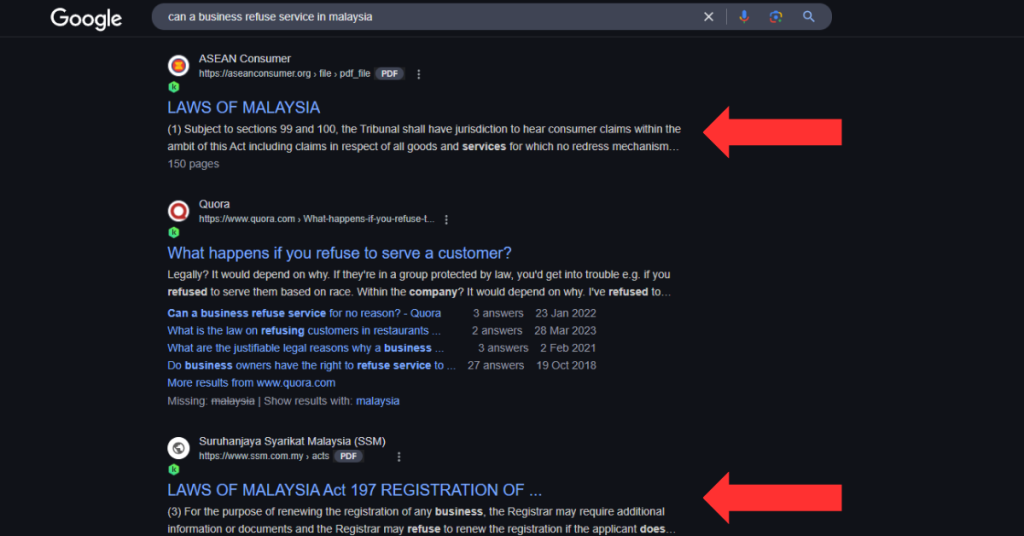Can businesses legally ban or turn a customer away in Malaysia? Here’s what the law says.
Can a business in Malaysia legally turn away customers? We look into Malaysian laws behind discrimination & the right to refuse service.

Disclaimer: This article is for general informational purposes only and is not meant to be used or construed as legal advice in any manner whatsoever. All articles have been scrutinised by a practising lawyer from Tristan & Partners to ensure accuracy.
If you’ve been around the internet in any capacity, then you’ve no doubt at least heard “Karen” be used as a slang term before.
Rather unfortunately for those actually named Karen, the word has entered English dictionaries as an insult to anyone who showcases entitled behaviour through public displays of criticism and complaints. And, notably, not of the civil kind.
Businesses tend to be the most frequent “victims” of these kinds of individuals.
But would they legally be able to refuse their services to them, or anyone for that matter, under any circumstances?
A “fundamental liberty”
Unlike the last few articles in our legal column, there actually wasn’t an immediate clear answer to this one.

A quick Google search would point you in the direction of the Consumer Protection Act 1999 as well as the Registration of Business Act 1956, however, neither of those actually cover our topic of discussion.
For that, we’ll have to look all the way back to article eight of our Federal Constitution, which touches on equality.
Article 8 of the Federal Constitution, states the following:
Except as expressly authorized by this Constitution, there shall be no discrimination against citizens on the ground only of religion, race, descent, place of birth or gender in any law or in the appointment to any office or employment under a public authority or in the administration of any law relating to the acquisition, holding or disposition of property or the establishing or carrying on of any trade, business, profession, vocation or employment.
In other words, so long as you’re not turning down a customer based on their gender, beliefs, colour of their skin, or country of origin, you’re good to go.
You can bid adieu to the troublemakers who take “the customer is always right” a little too seriously.
But that brings us on to another interesting question: what happens when you violate the constitution?
Not quite the same, but…
The Federal Constitution actually makes no reference to the punishment dealt in cases such as these.
But what we can do is look at a certain instance from the past.
 Image Credit: Malay Mail, courtesy of Honey Tan
Image Credit: Malay Mail, courtesy of Honey TanBack in 2014, Malay Mail reported on a case where a woman, Noorfadilla Ahmad Saikin, sued the government for refusing to employ her as a temporary teacher in light of her pregnancy.
She was awarded RM300,000 in damages for a breach of her constitutional right to gender equality. Additional fees were also charged to account for her loss of earnings, EPF, EPF dividends, compensation for “pain and suffering,” as well as costs.
This, Noorfadilla’s lawyer Honey Tan noted, was a first for the country as prior to this, damages paid for breach of constitutional rights had “never” been dealt before.
 Image Credit: Images used under licence from Shutterstock
Image Credit: Images used under licence from ShutterstockBut that being the case, she would later add that “Malaysian courts refuse to hold private actors like companies liable for breach of constitutional rights.”
In particular, she made reference to Beatrice Fernandez’s case where Beatrice had sued her former employer, Malaysia Airlines, for firing her after she became pregnant and refused to resign.
“To date, the courts are following the decision in Beatrice Fernandez that held that citizens can only bring a claim for breach of constitutional rights if the party doing the discrimination is a public authority,” she explained.
The golden rule
It goes without saying, of course, that this by no means is any excuse for businesses to suddenly swing things in the opposite direction.
Practically speaking, a business that treats themself as king won’t last for very long as potential customers would simply flock to competitors instead.
If a customer is respectful, then treat them with respect (even if they are a bit clueless and holding up the line a bit).
If they aren’t? Show them the door.
It’s as the saying goes. Treat others the way you wish to be treated.
Read other articles we’ve written law here. Read other articles we’ve written about Malaysian startups here.Featured Image Credit: @DFEfiercefun (X) / Images used under licence from Shutterstock

 Kass
Kass 































